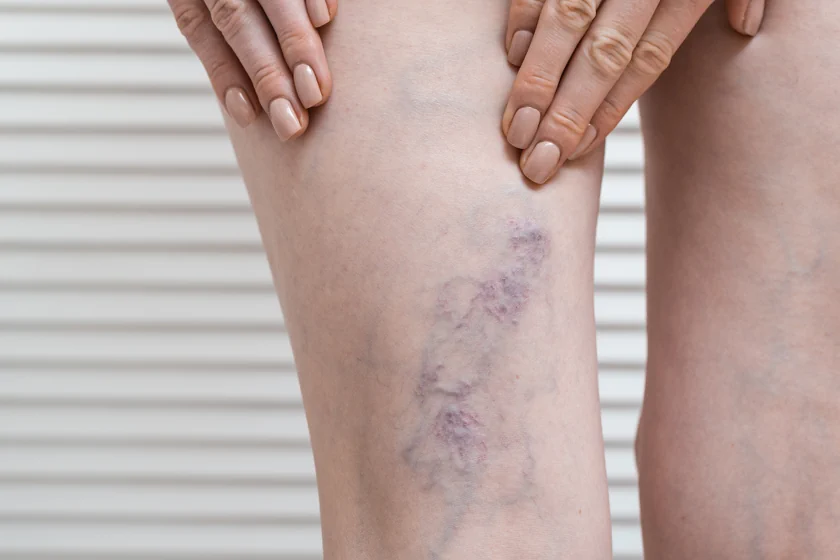
How Varicose Veins Lead to Skin Discoloration
Ever noticed those dark, unsightly patches on the legs that seem to appear out of nowhere? If you have varicose veins, those patches might not be as mysterious as they seem.
Varicose veins are nothing but those twisted, enlarged veins, often visible just under the surface of the skin, and they can indeed lead to skin discoloration.
But how exactly does this happen, and what can you do about it?
Let’s unravel this mystery and dive into the intricate relationship between varicose veins and skin discoloration.
Why Do Varicose Veins Cause Skin Discoloration?
According to a study conducted in India, approximately 20-30% of adults suffer from varicose veins, and a significant number of these individuals experience skin discoloration as a complication.
Hyperpigmentation, the darkening of an area of skin, can result from various factors, including:
Blood Pooling: As mentioned, blood that pools due to inefficient circulation in varicose veins can lead to dark patches on the skin.
Inflammation: Chronic inflammation around varicose veins can stimulate melanocytes, the cells responsible for pigment production, leading to darker skin.
Skin Damage: Repeated injury or trauma to areas with varicose veins can cause pigmentation changes as the skin heals.
Is Skin Discoloration from Vein Disease Permanent?
One of the most common concerns is whether skin discoloration from varicose veins is permanent. The answer varies depending on the severity of the condition and how promptly it is treated.
Early intervention can significantly improve the chances of reversing discoloration. However, if left untreated, the pigmentation can become permanent, and other complications such as ulcers may develop.
Are There Different Types of Skin Discoloration?
Yes, there are several types of skin discoloration associated with varicose veins:
- Hyperpigmentation: Dark brown or black patches resulting from the breakdown of red blood cells.
- Hemosiderin Staining: A specific type of hyperpigmentation where iron from red blood cells stains the skin.
- Eczema: Inflamed, itchy patches of skin that can turn darker over time.
- Lipodermatosclerosis: Hardening and darkening of the skin due to chronic inflammation and fat necrosis.
Why Does Skin Discoloration Cause Symptoms?
Skin discoloration itself might seem like a minor cosmetic issue, but it often accompanies other symptoms that can affect quality of life. These symptoms may include:
Itching and Irritation: Discolored skin can be itchy and uncomfortable, especially if eczema develops.
Swelling: Increased pressure in the veins can cause the legs swelling, leading to discomfort and heaviness.
Pain: Varicose veins and associated skin changes can be painful, particularly after long periods of standing or sitting.
Can Skin Discoloration from Varicose Veins Be Treated?
The good news is that skin discoloration from varicose veins can often be treated effectively. Early intervention is key to preventing permanent damage. Treatments focus on improving circulation, reducing inflammation, and addressing the underlying vein issues.
Patient Story: Rahul, a 52-year-old teacher from Delhi, had been experiencing pain and discoloration in his legs for years. Upon visiting Dr. Kapadia, he underwent endovenous ablation and started wearing compression stockings. Within a few months, Rahul noticed significant improvements in both his symptoms and the appearance of his skin.
Treatment of Skin Discoloration from Varicose Veins
Compression Therapy: Wearing compression stockings can help improve blood flow and reduce swelling. In India, compression stockings are widely used and recommended by healthcare professionals.
Lifestyle Changes: Regular exercise, a healthy diet, and avoiding long periods of standing or sitting can improve circulation and reduce symptoms.
Medications: Anti-inflammatory medications and creams can help reduce inflammation and improve skin appearance.
Sclerotherapy: This involves injecting a solution into the affected veins, causing them to collapse and fade over time. It’s a popular and effective treatment for varicose veins and associated discoloration.
Laser Therapy: Lasers can target and reduce the appearance of varicose veins and pigmentation. This non-invasive treatment offers quick recovery and minimal discomfort.
Endovenous Ablation: A minimally invasive procedure that uses heat to close off varicose veins, improving blood flow and reducing discoloration.
Surgical Options: In severe cases, surgery might be necessary to remove or repair damaged veins.
Real-Life Example from a Vascular Surgeon’s Perspective
Dr. Sumit Kapadia, a renowned Varicose Veins specialist in Vadodara, shares a compelling case from his practice.
A middle-aged woman came to him with significant skin discoloration and swelling in her legs. She had ignored her varicose veins for years, assuming they were merely a cosmetic issue. Dr. Kapadia performed a combination of sclerotherapy and lifestyle modifications.
Within months, her skin color improved dramatically, and her symptoms reduced. This case highlights the importance of timely intervention and professional treatment.
Conclusion
Varicose veins are more than just a cosmetic nuisance; they can cause significant skin discoloration and other complications if left untreated. Early intervention and professional treatment can help manage symptoms, improve skin appearance, and prevent further health issues.
Dr. Sumit Kapadia, a renowned vascular surgeon in Vadodara, emphasizes the importance of addressing varicose veins promptly.
If you notice skin discoloration or other symptoms related to varicose veins, don’t hesitate to seek medical advice and explore the various treatment options available.
FAQs
Yes, untreated varicose veins can lead to complications such as ulcers, chronic pain, and increased risk of deep vein thrombosis.
While home remedies like leg elevation and compression stockings can help, professional treatment is often necessary for significant improvement.
Improvement can be seen within weeks to months, depending on the treatment method and individual response.
Yes, laser therapy is a safe and effective treatment with minimal side effects and quick recovery times.
Lifestyle changes can help manage symptoms and prevent worsening but are often most effective when combined with medical treatments.

MBBS, MS, MRCS, DNB-Fellow
Dr. Sumit Kapadia
Dr. Sumit Kapadia / MR KAPADIA SUMIT a gold-medalist from Baroda Medical College, obtained his general surgical training and senior residency from SSG Hospital, Vadodara.

MBBS, MS, MRCS, DNB-Fellow
Dr. Sumit Kapadia
Dr. Sumit Kapadia / MR KAPADIA SUMIT a gold-medalist from Baroda Medical College, obtained his general surgical training and senior residency from SSG Hospital, Vadodara.



